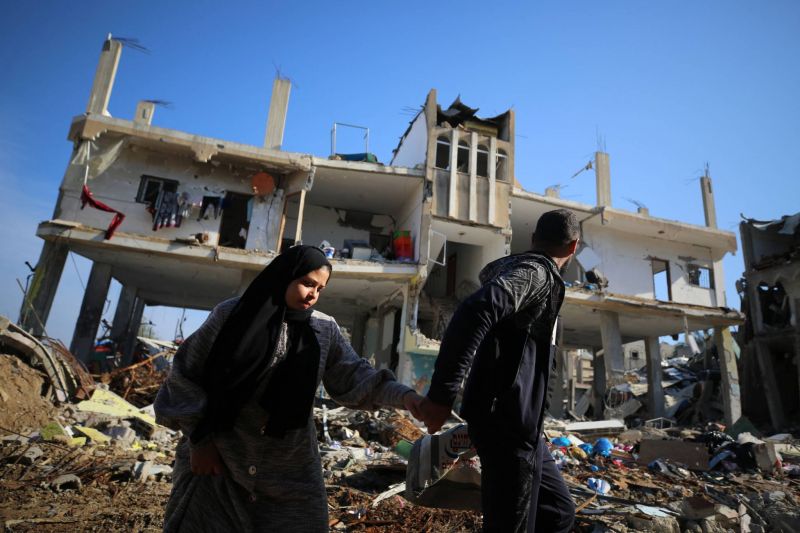
Palestinian people walk past a destroyed building in the al-Maghazi refugee camp in central Gaza Strip, on January 16, 2024, amid ongoing battles between Israel and the Palestinian group Hamas. (Credit: AFP)
Monday was the deadliest day of fighting for the Israeli army since the war started, as its troops pushed farther into the besieged Gaza Strip in the fourth month a devastating offensive. Israeli media reported 24 Israeli soldiers were killed in 24 hours.
According to Haaretz, three paratrooper officers were killed in western Khan Younis – the largest city in the south of the enclave – which the Israeli army declared Tuesday it had surrounded, and where residents and displaced Gazans say they have been experiencing the most intense fighting since Oct. 7.
The other 21 Israeli soldiers, all reserve troops, were killed in an incident in al-Maghazi refugee camp, just 600 meters from the highly militarized border between Gaza and Israel. Maghazi is located in the Deir al-Balah governorate in central Gaza.
The Israeli army declared “operational control” in Maghazi in mid-December, Haaretz reports, having claimed to have killed or wounded most of the Hamas fighters who remained in the area. The soldiers operating there Monday were part of an operation demolishing buildings and tunnels in Maghazi, which Haaretz says is mostly emptied of residents.
Citing the Israeli army, Reuters reported that the incident occurred when a rocket-propelled grenade was fired at a tank guarding troops who were preparing buildings for demolition.
At the same time as the grenade was fired on the tank, so the report goes, an explosion caused two separate two-story buildings to collapse on top of the soldiers who were planting explosives as part of the troops’ operations razing buildings along the Gaza border.
"We are still examining and investigating the details of the event and the reason for the explosion," Israeli army spokesperson Daniel Hagari said.
According to the Israeli army, two of the soldiers were killed by the initial strike on the tank and the remaining nineteen died when the buildings exploded.
Israeli army Chief of Staff Herzi Halevi said in a video statement that the soldiers “fell in battle near the border fence during a defense operation in the buffer zone.”
Later on Tuesday, Hamas' armed wing, al-Qassam Brigades, claimed responsibility for firing the rocket that hit the tank and caused the Israeli army's explosives to detonate.
Reuters quoted a statement by Hamas released to media, which said, "Watch the execution by al-Qassam Brigades fighters of a compound operation against the enemy soldiers and vehicles east of the al-Maghazi refugee camp," and was accompanied by a video of the attack.
The 'buffer zone'
Mentions of the buffer zone first showed up in media reports when Israel informed Arab states in early December it would carve out a “security zone" within Gaza, all along its border with Israel. Three Israeli officials told the New York Times that Israel's goal is to create an open space, making it harder for militants to repeat a raid like that of Oct. 7.
Reuters interviewed a senior regional security official in its report on Israel’s intentions with the buffer zone, who spoke on condition of anonymity, saying "Israel wants this buffer zone between Gaza and Israel from the north to the south to prevent any Hamas or other militants from infiltrating or attacking Israel."
This involves leveling an area almost a kilometer wide all along the inside of the enclaves' border, significantly reducing the space left for Palestinian communities inside the besieged Strip. The border is roughly 57 kilometers long and the Strip is six kilometers wide at its most narrow.
Qatar-based news outlet Al Jazeera reported on Monday’s incident and Israel’s intentions along the Gaza border, saying the army’s activities could be in violation of US policy and international law. “There is ample footage online of Israeli soldiers blowing up buildings in Gaza in apparent controlled demolitions,” Al Jazeera stated.
On Nov. 8, US Secretary of State Antony Blinken outlined Washington’s red lines and expectations for Israeli operations in Gaza: “No reoccupation of Gaza after the conflict ends. No attempt to blockade or besiege Gaza. No reduction in the territory of Gaza," Blinken said.
On Tuesday, White House national security spokesperson John Kirby reiterated the States' objections to Israel's buffer zone plans, telling reporters "We do not want to see the territory of Gaza reduced in any way. We won't support that."
Al Jazeera also referenced the Fourth Geneva Convention, which prohibits the destruction of private or state property, “except where such destruction is rendered absolutely necessary by military operations.”
The New York Times interview Balakrishnan Rajagopal, the United Nations special rapporteur on the right to adequate housing, who told the American newspaper that Israel's buffer zone plans could constitute a war crime. Demolishing Palestinian border homes can not be justified as part of a military operation because they pose no immediate threat.
“There is simply no provision in the Geneva Conventions for what Israel is doing along the border, which is kind of a pre-emptive clearing of property,” Rajagopal told NYT. “On a particular property by property basis, Israel can take action — but not on a widespread basis across the entire border."